Last updated: 01.10.2025
 Batteries and accumulators are an integral part of the modern economy. They are a source of electrical energy generated by the direct conversion of chemical energy, used in millions of everyday devices, electric vehicles, industrial systems, and medical equipment. However, their uncontrolled marketing and lack of proper management can lead to serious environmental hazards.
Batteries and accumulators are an integral part of the modern economy. They are a source of electrical energy generated by the direct conversion of chemical energy, used in millions of everyday devices, electric vehicles, industrial systems, and medical equipment. However, their uncontrolled marketing and lack of proper management can lead to serious environmental hazards.
For this reason, both national and EU regulations, including the Act of April 24, 2009 on batteries and accumulators and Regulation (EU) 2023/1542, impose numerous obligations on businesses related to labeling, record keeping, recycling, and responsibility for used batteries and accumulators.
In this article, we present a comprehensive overview of the requirements, including the latest changes resulting from the “battery” regulation, as well as practical tips for companies operating on the Polish market.
Battery Market in Poland – Legal Framework and EU Regulations
The marketing of batteries and accumulators in Poland and within the European Union is based on comprehensive legal provisions aimed at ensuring a high level of protection for the environment and human health, as well as harmonizing market rules.
The key national legal act is the Act of April 24, 2009, on batteries and accumulators, which regulates, among other things, the obligations of producers, distributors, and users with regard to the placing on the market, collection, treatment, and recycling of waste batteries and accumulators.
The Act implements earlier EU requirements, providing the basis for the national system for the management of these products. Currently, the legal framework is supplemented and significantly developed by Regulation (EU) 2023/1542 on batteries and spent batteries, which is directly applicable in all Member States.
The new law also introduces extended producer responsibility (EPR) covering the entire battery life cycle, detailed rules on labeling, collection, recycling, and record-keeping, and provides for the establishment of a deposit-refund system. The combined application of both regulations sets out a legal framework to ensure the sustainable development of the battery and accumulator sector and to reduce its negative impact on the environment.
Classification of batteries and accumulators in Poland
The Act distinguishes between three basic groups of batteries:
- Portable batteries and accumulators that are sealed, can be carried by hand, and are used in phones, laptops, toys, and remote controls. It is portable accumulators and portable batteries that are most commonly found in everyday life.
- Industrial batteries and accumulators – intended for professional and industrial applications, including electric vehicles, emergency power systems, and large installations. Industrial lead-acid batteries and industrial lead-acid accumulators constitute a special category.
- Car batteries and accumulators – used for starters, lighting, and ignition. In practice, this mainly means lead-acid accumulators and batteries.
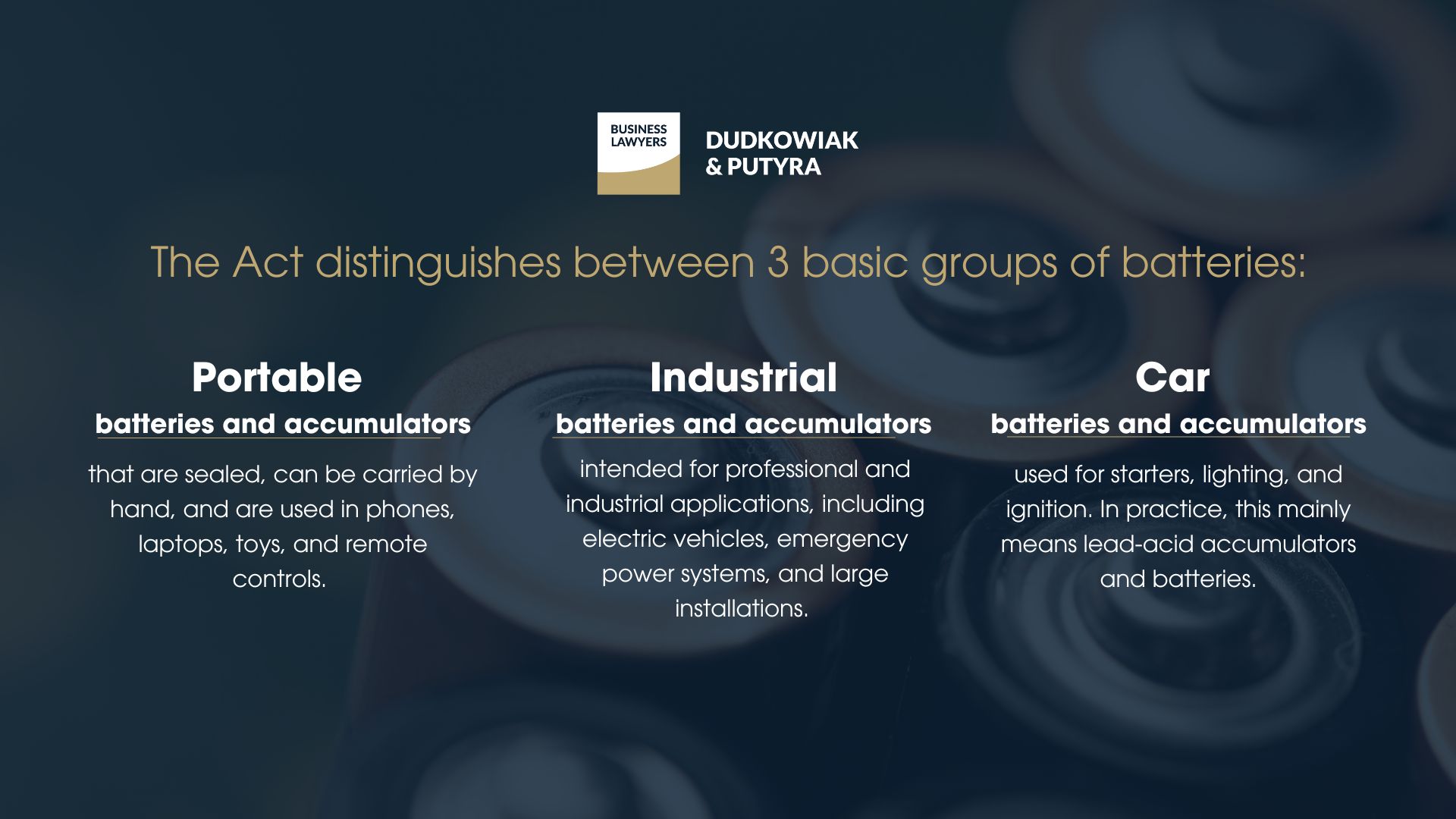
Battery Production in Poland – Requirements
The production of batteries and accumulators in the light of applicable laws requires consideration of both safety requirements and sustainable design principles.
According to the Batteries and Accumulators Act, equipment in which batteries are installed must be accompanied by instructions in Polish containing information on how to safely remove the batteries and the type of cells used.
In addition, as of February 18, 2027, a design requirement for batteries used in light means of transport (LMTs) has been introduced – they must be replaceable by the end user or an independent service provider. This means that batteries should be designed in such a way that they can be easily removed and replaced using commonly available tools.
In practice, this will be particularly important for electric bicycles, where many models currently have permanently integrated batteries, which makes servicing and recycling difficult.
Meeting these requirements requires manufacturers not only to change the design of the battery, but also to take into account environmental and ergonomic aspects so that the entire life cycle of the product is safe and can be effectively recycled.
Hazardous Substances in Batteries – Limits and Exceptions
According to Article 8 of the Act, batteries and accumulators placed on the market may not contain more than 0.0005% mercury and 0.002% cadmium.
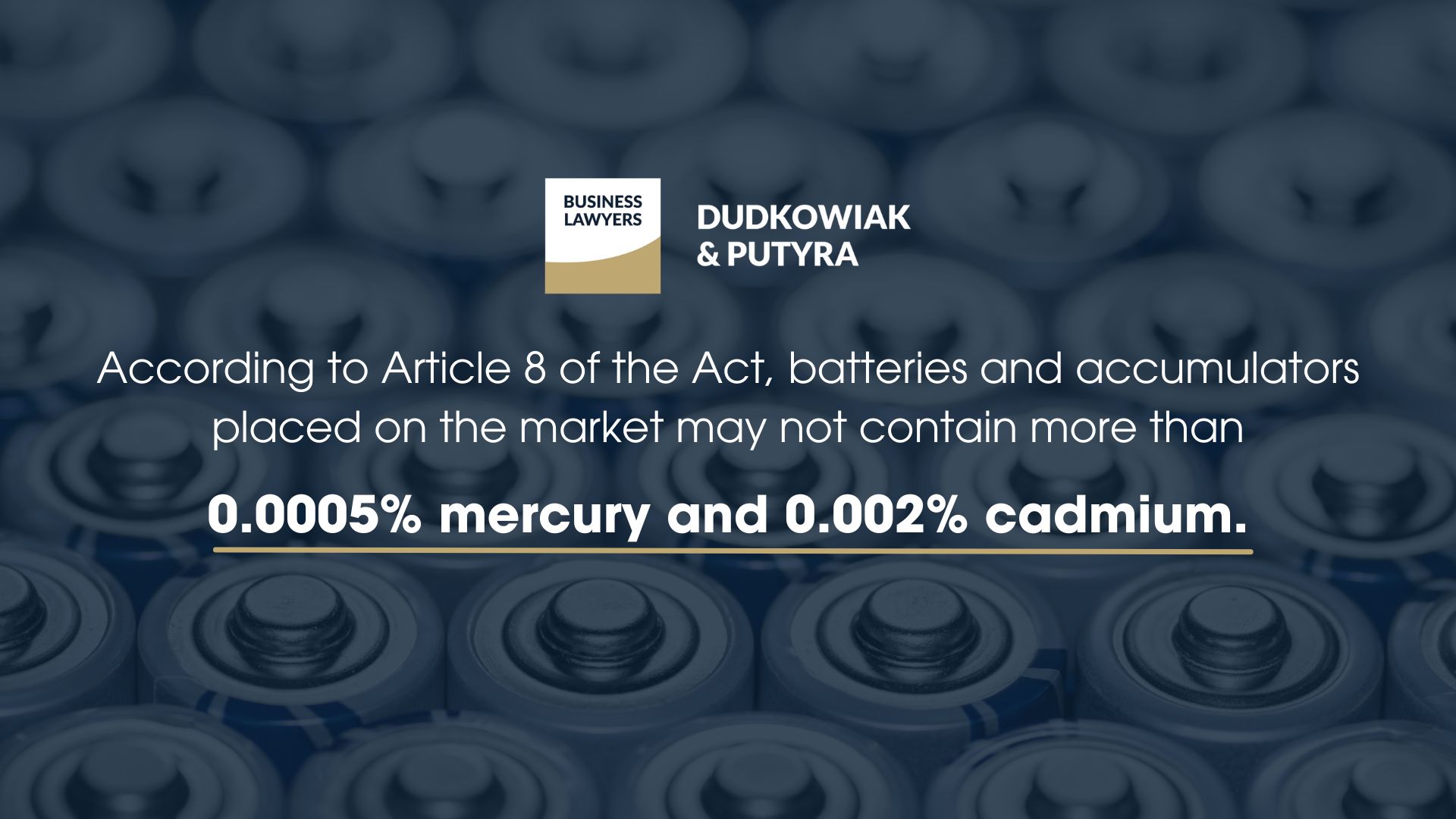
The only exception is for batteries used in emergency systems and medical devices.
Battery Labelling Requirements in the EU and Poland
Batteries must be marked with the selective collection symbol (crossed-out wheelie bin) and, in the case of lead, cadmium, or mercury content, also with the appropriate chemical symbols.
Accumulators marked in a visible, legible, and durable manner may be placed on the market, while the lack of marking constitutes a violation of the law.
Battery Information and Labelling Requirements – Digital Battery Passport and Eco Markings
- Manufacturers must ensure that the battery has:
- a digital battery passport – from 2027 for batteries above a certain capacity.
- labels containing information on carbon footprint, chemical composition, durability, and capacity.
- The information must be legible and durable, both physically on the product and digitally accessible.
EU Regulation on Battery Distributors – Market Placement Rules
Product Compliance in the EU Battery Regulation – Each Individual Item Matters
- The requirements of the Regulation apply to each individual battery, not just the model.
- Placing on the market is counted from the actual availability of a specific item on the EU market, not from the date of approval or stock availability.
From August 18, 2025, it will be prohibited to place on the market a specific battery that does not meet the technical requirements of the regulation, even if it belongs to a previously approved model.
Registration in the BDO (Waste Database) – Legal Requirement for Battery Market Placement in Poland
The first step is to obtain an entry in the Waste Database (BDO). The BDO number must be included on invoices, receipts, contracts, and record-keeping documents.
Without an entry in the BDO, it is not possible to legally trade batteries and accumulators in Poland.
Battery Introducer Definition – Who is a Producer under EU Law?
A battery or accumulator introducer is an entrepreneur who introduces batteries or accumulators – including those installed in equipment or vehicles – to the Polish market for the first time.
An introducer is also an entrepreneur who:
- imports or intra-Community acquires batteries, e.g., imports laptops with batteries attached;
- has commissioned the manufacture of batteries and whose marking has been placed on the product;
- manufactures batteries in Poland and distributes them independently.
This definition is broad and covers both large manufacturers and small entities importing distributed equipment with batteries attached.
Battery Recycling, Collection and Reuse Obligations in Poland
Manufacturers in Poland are required to:
- properly manage used batteries – organize systems for collecting used batteries,
- ensure minimum levels of recycled materials in batteries (e.g., cobalt, lithium, nickel),
- ensuring that batteries are recyclable in accordance with the objectives of the regulation,
- processing used batteries and recycling them to recover raw materials.
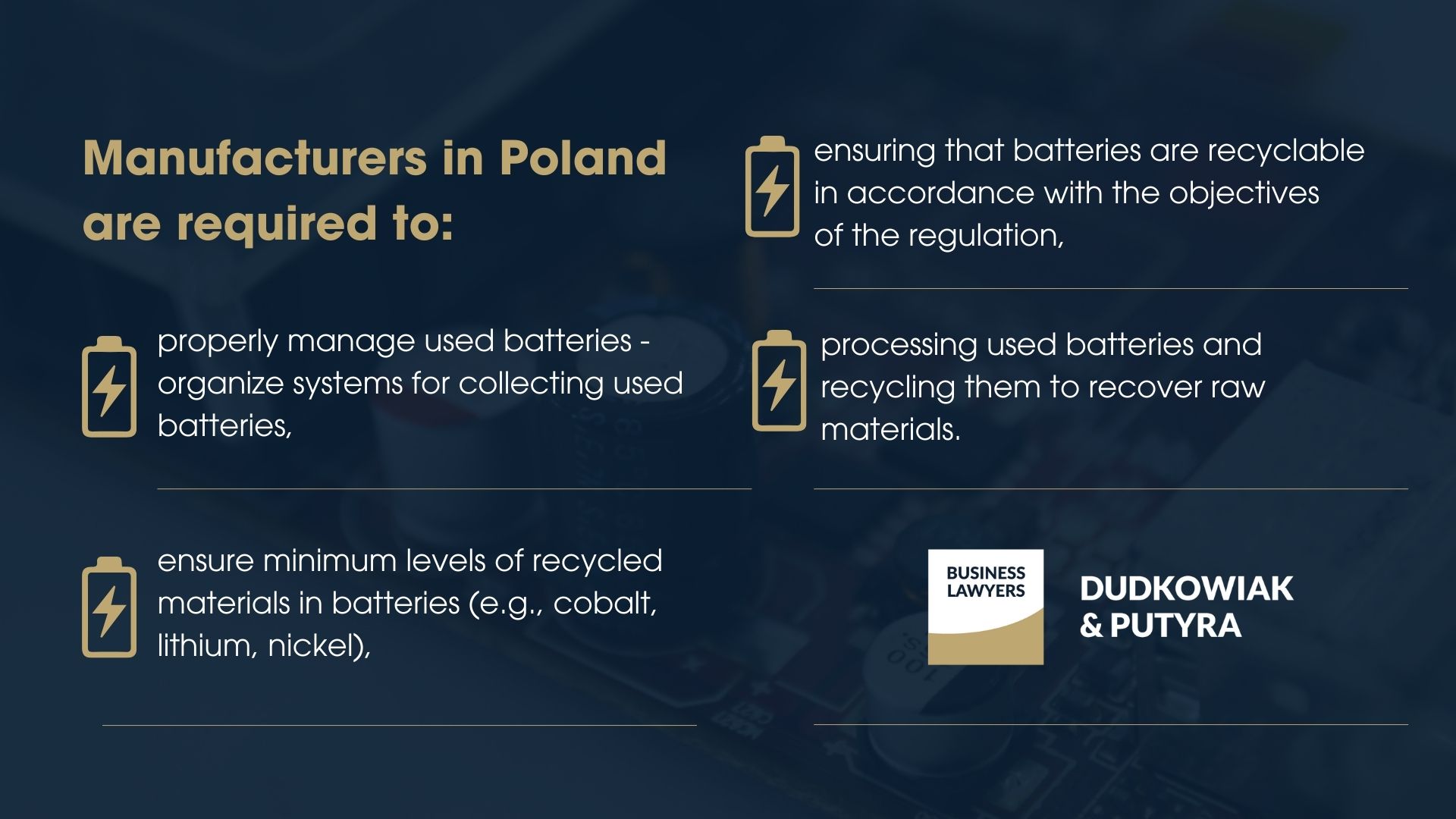
Collectors of Used Batteries – Key Legal Duties in Poland
Entities involved in the collection of used batteries and accumulators play an important role in the waste management system. Collectors of used batteries or accumulators have a number of obligations specified in the Act and implementing acts.
The most important ones include:
- Collection of used batteries and used portable accumulators from collection points with which a contract has been concluded.
- Collection point means a designated part of a building controlled by an entity whose primary activity is not waste management. These may include:
- schools,
- educational or cultural and educational institutions,
- offices and institutions,
- service points offering battery or accumulator replacement,
- commercial outlets operated by retailers or wholesalers of portable batteries, where end users can return used portable batteries and used portable accumulators.
- Transfer of collected batteries and used accumulators to a waste battery or accumulator treatment facility for recycling or disposal.
- Keeping records containing information on the weight of collected waste portable batteries and accumulators, both in total and broken down by individual battery distributors with whom the collector has concluded agreements.
This system is crucial for achieving the required collection rate and ensuring proper management of waste batteries in Poland.
Retailers and Wholesalers – Obligations for Portable and Car Batteries in Poland
Retailers also play an important role in the waste management system.
- Retailer:
- is obliged to accept used portable batteries from the end user,
- may not charge for collection,
- in the case of the sale of lead-acid car batteries, must charge a deposit to the customer if they do not return the used battery.
- Wholesaler of portable batteries:
- accepts used batteries from retailers to whom they have supplied portable batteries,
- passes them on to treatment facilities.
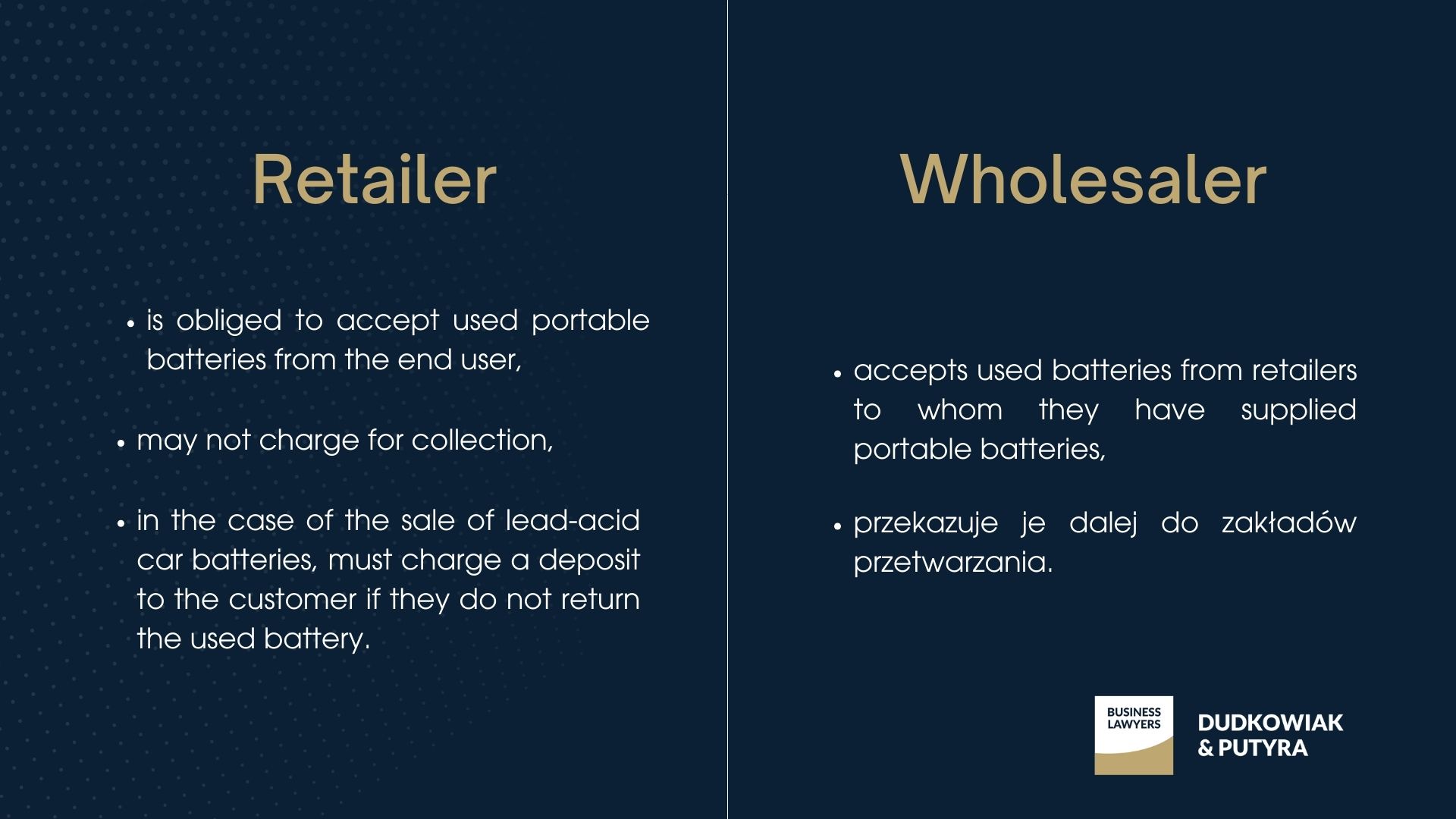
These obligations support the achievement of minimum collection rates and reduce the negative impact of batteries on the environment.
Environmental Impact of Batteries and Design Responsibilities in Poland
The regulations on batteries and accumulators are not limited to technical requirements and labeling. EU legislators and legislation also emphasize reducing the negative impact of batteries on the environment and taking their life cycle into account at the design stage.
Batteries and accumulators should be:
- labeled with information on the possible impact of the substances used on health and the environment,
- designed in such a way as to enable their recycling, replacement, and safe disposal after use,
- labeled and equipped with instructions in accordance with the principles of selective collection, which is crucial for achieving the required recovery and recycling levels.
In practice, this means that environmental requirements permeate the entire process—from design and labeling to the end of the product’s life.
Educational Campaigns on Battery Recycling in Poland
Those placing batteries or accumulators on the market are required to finance public education campaigns. Public education campaigns include all activities aimed at raising public awareness of the proper handling of waste in the form of used batteries and accumulators and supporting the achievement of a high level of selective collection of this waste.
These activities may include, among others:
- informing end users about the possible impact of substances contained in batteries and accumulators on the environment and human health,
- recommending selective waste collection,
- providing information on available collection and recycling systems,
- highlighting the role of users in contributing to the recycling of used batteries and accumulators,
- explaining the meaning of the symbols specified in the relevant annexes to the Act.
Public education campaigns may be conducted using the mass media, leaflets, information brochures, and posters, as well as by organizing competitions, conferences, and other informational and educational activities.
The introducer of batteries or accumulators shall fulfill the obligation to finance the campaign in one of the following ways:
- allocate to public education campaigns, by March 1 of the year following the year to which the fee relates, an amount at least equal to that fee, or
- pay a fee for public educational campaigns into a separate bank account of the marshal’s office by March 15 of the year following the year to which the fee relates.
Control and Sanctions for Non-Compliant Batteries in Poland
Compliance with the provisions on batteries is subject to control by the Trade Inspection and the Environmental Protection Inspection. These authorities may:
- issue a decision to withdraw non-compliant products from the market,
- impose an obligation to bear the costs of disposing of used batteries or transporting them to a treatment facility,
- impose financial penalties for failure to enter the BDO register, failure to report, or failure to achieve the required collection levels.
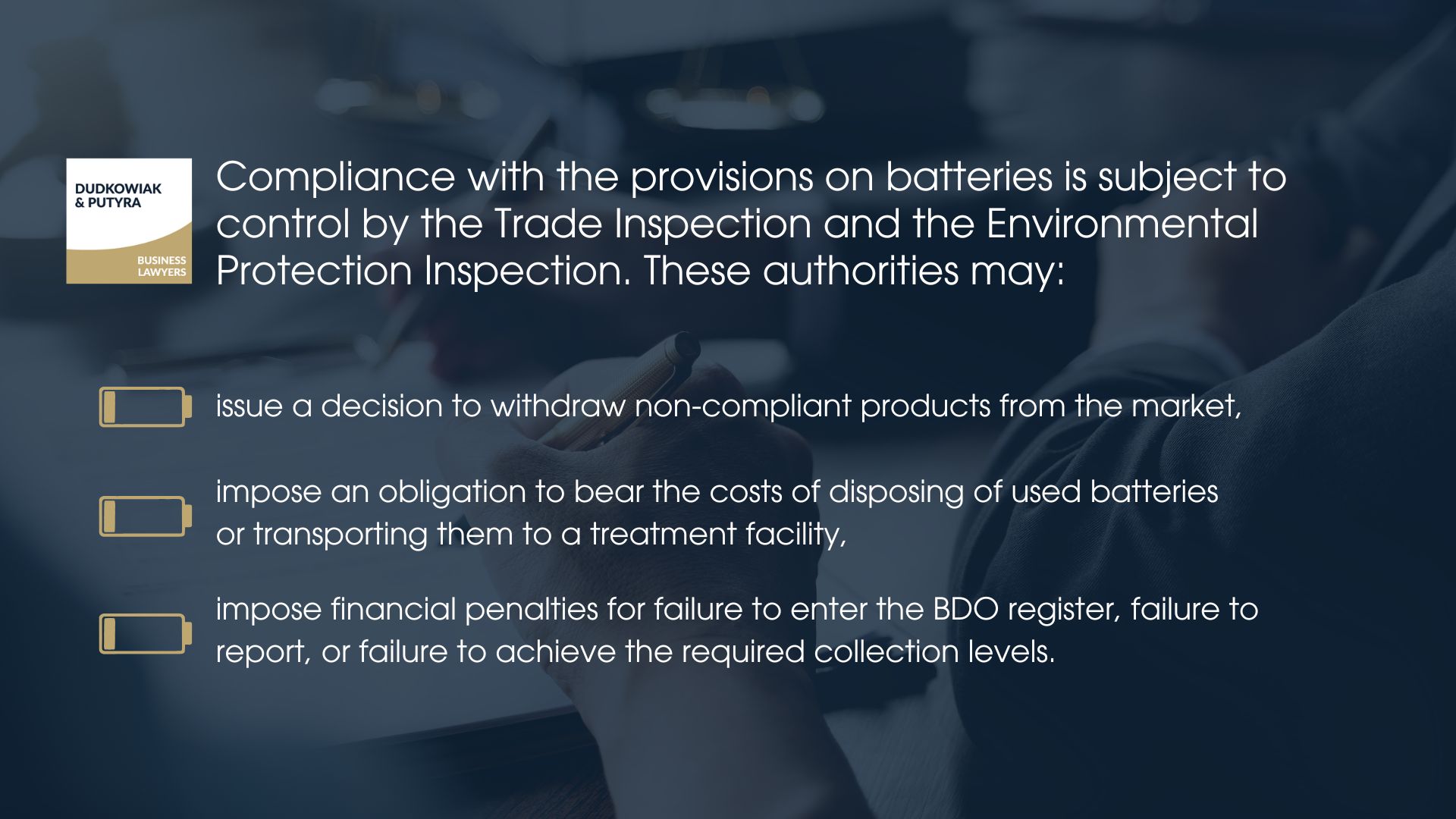
In addition, in the event of failure to fulfill their obligations, businesses must pay a product fee. The amount of this fee is determined as the product of the product fee rate and the weight of the product placed on the market (e.g., the weight of used portable batteries that were not covered by the collection system). This fee serves as a financial sanction, motivating entrepreneurs to ensure the proper management of used batteries.
Failure to pay the fee on time may lead to administrative enforcement and additional interest costs. In practice, this means that not only environmental but also economic aspects compel entrepreneurs to reliably fulfill their obligations regarding batteries and accumulators.
Battery Supply Chain Responsibility – Extended Producer Responsibility (EPR)
According to Regulation (EU) 2023/1542 of the European Parliament and of the Council, the term “producer” has a broad meaning and includes not only the actual manufacturers of batteries.
A producer within the meaning of the regulations is any natural or legal person who places batteries on the EU market under their own name or trademark, regardless of whether they actually manufacture them.
This means that an importer, distributor, or other entity established in a Member State that first supplies batteries (including those incorporated into appliances or vehicles) to the EU market, resells them without revealing the manufacturer’s brand, or sells them remotely to end users may also be a producer.
In practice, this means that many entities involved in the supply chain – if they operate under their own brand – may be considered manufacturers within the meaning of the regulation and bear the resulting obligations, including ensuring that their products comply with EU regulations.
A distributor or importer may also be considered a manufacturer within the meaning of the Regulation if they supply batteries under their own trademark (Article 3(47)).
This means that even if a company does not manufacture batteries but sells them as its “own,” it bears full responsibility for their compliance with the Regulation.
Transitional Provisions – Battery Regulation Deadlines 2025 and 2027
- Batteries that were placed on the market before August 18, 2025, may continue to be sold legally, even if they do not comply with the new requirements.
- Withdrawal from the contract or return of the battery does not revoke the fact that it was placed on the market.
- However, any new item (e.g., as part of a service replacement) placed on the market after August 18, 2025, must already comply with the regulations.
- From 2027, there will also be a requirement for a digital battery passport and replaceability in light transport.
Summary – Key Takeaways from the Battery Regulation in Poland
For battery manufacturers, Regulation 2023/1542 is a regulatory revolution. It requires:
- greater transparency,
- environmental responsibility,
- adaptation of battery design to the principles of dismantling and replaceability,
- and full traceability of when and where a given battery was made available on the EU market.
A practical approach requires preparation now:
- schedules for selling off current stocks,
- updating battery designs,
- and reviewing contracts with suppliers and importers.
Otherwise, there is a risk that from August 2025, a manufacturer not be able to legally place even its own product on the market if it does not meet the stringent technical requirements of the new regulation.
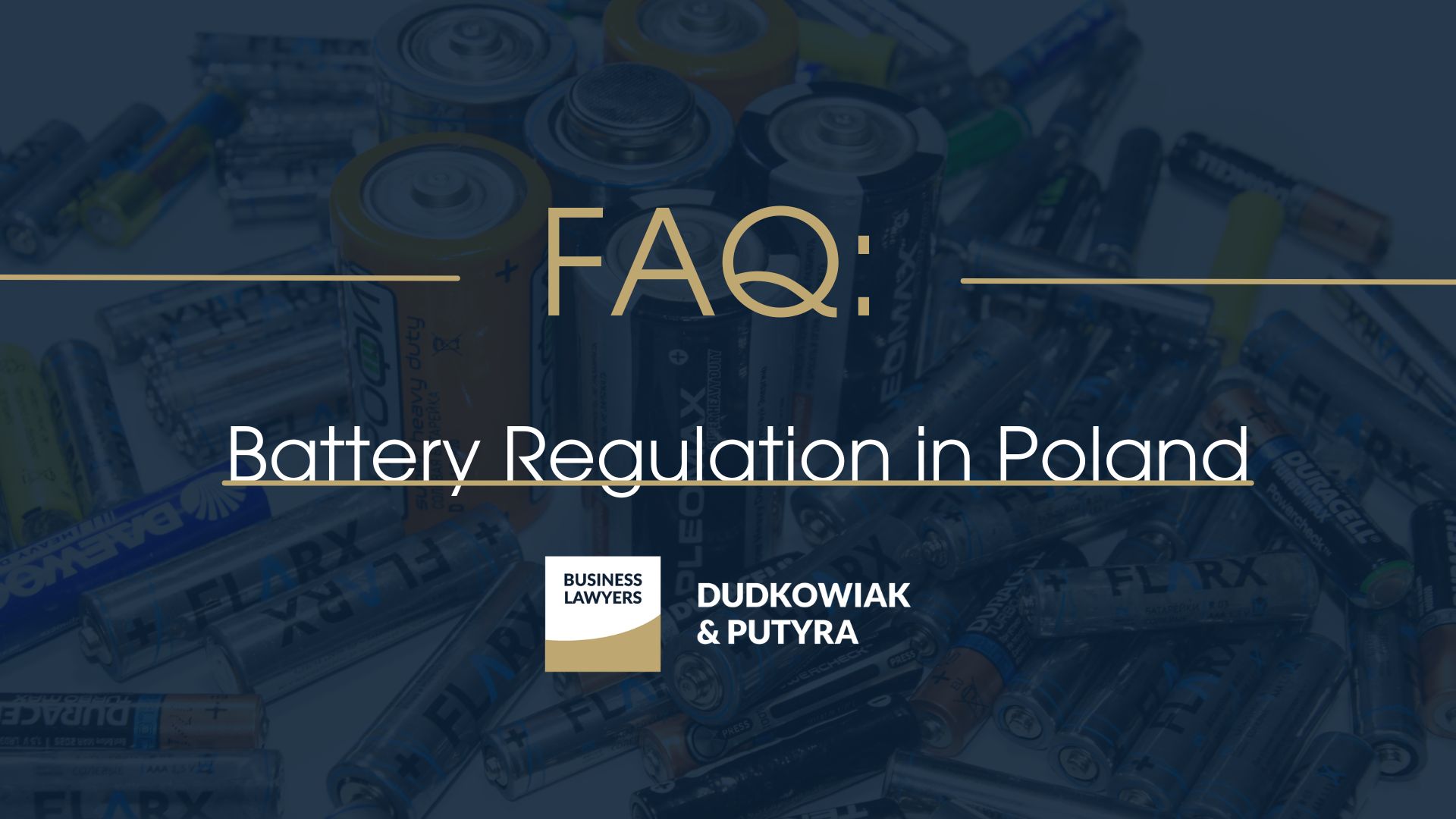
FAQ – Battery Regulation in Poland
What does Regulation (EU) 2023/1542 require regarding placing batteries on the market?
The regulation introduces strict obligations on battery manufacturers to ensure that each individual battery unit – including portable batteries, industrial batteries, consumer batteries, primary batteries such as alkaline batteries or zinc carbon batteries, as well as electric vehicle batteries and lithium ion batteries – meets full compliance with the environmental protection requirements before being legally placed on the EU market.
How does the EU battery regulation affect non-compliant inventory?
From 18.08.2025, non-compliant rechargeable batteries or primary batteries cannot be placed on the market, even if they belong to an already approved battery type. Manufacturers must plan inventory clearance of waste batteries to avoid negative effects such as financial losses and regulatory sanctions.
What design requirements apply to batteries used in electric vehicles and electronic devices?
Under Article 11, li ion batteries and ion batteries used in electric vehicles, electric bicycles, and electronic devices must comply with durability requirements. By 18.02.2027, they must be designed for removability and replaceability with commonly available tools, supporting the circular economy and reducing environmental impact.
What are the labelling and information obligations for battery systems?
Manufacturers must provide detailed information through a digital battery passport and physical labelling, including data on carbon footprint, capacity greater thresholds, durability requirements, hazardous substances, critical materials, and recycled content such as recovered cobalt and raw materials.
Compliance may require third party verification or a notified body under applicable delegated acts.
How are due diligence obligations and producer responsibility defined?
The regulation imposes due diligence obligations and diligence obligations across the battery supply chain, requiring producers to address identified risks related to environmental risks and human health.
The broad definition of “producer” covers importers, distributors, and sellers operating under their own trademark, who must also engage with producer responsibility organizations and implement extended producer responsibility schemes, including collection schemes for spent batteries.
What obligations exist regarding collection, recycling and recovered materials?
Manufacturers must organise waste management and collection schemes for battery waste, ensure recycling efficiency in recycling facilities, and guarantee minimum levels of recovered materials such as lithium, nickel, and nickel cadmium. This aligns with the European Green Deal, circular economy goals, and the need to meet global demand for critical materials.
How do transitional provisions impact batteries placed on the market before August 2025?
Battery systems placed on the market before 18.08.2025 – including button cell and lead acid batteries – may continue to be sold legally. However, each new unit made available after this date must comply with all obligations introduced by the regulation, including ce marking, eu safety requirements, and conformity with environmental protection requirements.

